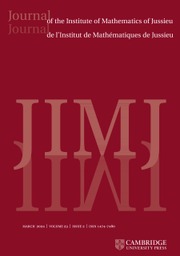The proof of [Reference Binda and Merici1, Lemma 7.2] contains a gap: the equality
![]() $\omega _{\sharp } h_{0}(\Lambda _{\mathrm {ltr}}(\eta ,\mathrm {triv})) = \omega _{\sharp } h_{0}(\omega ^{*}\Lambda _{\mathrm {tr}}(\eta ))$
is false. Indeed one can check that for
$\omega _{\sharp } h_{0}(\Lambda _{\mathrm {ltr}}(\eta ,\mathrm {triv})) = \omega _{\sharp } h_{0}(\omega ^{*}\Lambda _{\mathrm {tr}}(\eta ))$
is false. Indeed one can check that for
![]() $X\in \mathbf {Sm}(k)$
proper,
$X\in \mathbf {Sm}(k)$
proper,
as the left-hand side is
![]() $\mathbf {G}_{a}(\eta _{X})$
, whereas the right-hand side is
$\mathbf {G}_{a}(\eta _{X})$
, whereas the right-hand side is
![]() $\mathbf {G}_{a}(X)$
. For now, we can give a proof only of a weaker version of [Reference Binda and Merici1, Proposition 7.3]:
$\mathbf {G}_{a}(X)$
. For now, we can give a proof only of a weaker version of [Reference Binda and Merici1, Proposition 7.3]:
Proposition 0.1. Let k be a perfect field. Then the compositions
are faithful and exact. In particular, both functors are conservative.
Proof. Exactness follows from the exactness of i and
![]() $\omega _{\sharp }^{\log }$
(resp.,
$\omega _{\sharp }^{\log }$
(resp.,
![]() $i^{\mathrm {tr}}$
and
$i^{\mathrm {tr}}$
and
![]() $\omega _{\sharp }^{\mathrm {ltr}}$
). To show faithfulness, it is enough to show that for all
$\omega _{\sharp }^{\mathrm {ltr}}$
). To show faithfulness, it is enough to show that for all
![]() $F \in \mathbf {CI}^{\log }_{{\mathrm {dNis}}}$
(resp.,
$F \in \mathbf {CI}^{\log }_{{\mathrm {dNis}}}$
(resp.,
![]() $\mathbf {CI}^{\mathrm {ltr}}_{{\mathrm {dNis}}}$
), the unit map
$\mathbf {CI}^{\mathrm {ltr}}_{{\mathrm {dNis}}}$
), the unit map
is injective. By [Reference Binda and Merici1, Theorem 5.10], we have that for all
![]() $X \in \mathbf {SmlSm}(k)$
,
$X \in \mathbf {SmlSm}(k)$
,
and hence
![]() $u\colon F\hookrightarrow \omega ^{*}_{\log }\omega _{\sharp }^{\log } F$
(resp.,
$u\colon F\hookrightarrow \omega ^{*}_{\log }\omega _{\sharp }^{\log } F$
(resp.,
![]() $u^{{\mathrm {tr}}}\colon F\hookrightarrow \omega ^{*}_{\mathrm {ltr}}\omega _{\sharp }^{\mathrm {ltr}} F$
) is injective. Because F is
$u^{{\mathrm {tr}}}\colon F\hookrightarrow \omega ^{*}_{\mathrm {ltr}}\omega _{\sharp }^{\mathrm {ltr}} F$
) is injective. Because F is
![]() ${\overline {\square }}$
-local, the map u (resp.,
${\overline {\square }}$
-local, the map u (resp.,
![]() $u^{{\mathrm {tr}}}$
) factors through
$u^{{\mathrm {tr}}}$
) factors through
![]() $\omega ^{\mathbf {CI}}_{\log }\omega _{\sharp }^{\log } F$
(resp.,
$\omega ^{\mathbf {CI}}_{\log }\omega _{\sharp }^{\log } F$
(resp.,
![]() $\omega ^{\mathbf {CI}}_{\mathrm {ltr}}\omega _{\sharp }^{\mathrm {ltr}} F$
), which concludes the proof.
$\omega ^{\mathbf {CI}}_{\mathrm {ltr}}\omega _{\sharp }^{\mathrm {ltr}} F$
), which concludes the proof.
We believe that the full statement of a more general version of [Reference Binda and Merici1, Proposition 7.3] holds:
Conjecture 0.2. The functors of Proposition 0.1 are full.
We stress that the previous statement does not assume (RS), nor transfers. We cannot give a proof of [Reference Binda and Merici1, Lemma 7.2] at the moment, but we expect the statement to hold as a consequence of the following conjecture:
Conjecture 0.3. The inclusion
![]() $\iota ^{\mathrm {tr}}\colon \mathbf {CI}^{\mathrm {ltr}}_{{\mathrm {dNis}}}(k,\Lambda )\subseteq \mathbf {Shv}_{\mathrm {dNis}}^{\mathrm {ltr}}(k,\Lambda )$
is Serre – that is, for all
$\iota ^{\mathrm {tr}}\colon \mathbf {CI}^{\mathrm {ltr}}_{{\mathrm {dNis}}}(k,\Lambda )\subseteq \mathbf {Shv}_{\mathrm {dNis}}^{\mathrm {ltr}}(k,\Lambda )$
is Serre – that is, for all
![]() $F\in \mathbf {CI}^{\mathrm {ltr}}_{{\mathrm {dNis}}}(k,\Lambda )$
, if
$F\in \mathbf {CI}^{\mathrm {ltr}}_{{\mathrm {dNis}}}(k,\Lambda )$
, if
![]() $G\subseteq F$
is a subsheaf with log stransfers, then G is strictly
$G\subseteq F$
is a subsheaf with log stransfers, then G is strictly
![]() ${\overline {\square }}$
-invariant – that is, G lies in
${\overline {\square }}$
-invariant – that is, G lies in
![]() $\mathbf {CI}^{\mathrm {ltr}}_{{\mathrm {dNis}}}(k,\Lambda )$
.
$\mathbf {CI}^{\mathrm {ltr}}_{{\mathrm {dNis}}}(k,\Lambda )$
.
If Conjecture 0.3 holds, then the counit map
![]() $\iota ^{\mathrm {tr}} h^{0}_{\mathrm {ltr}}G\to G$
is a monomorphism for all
$\iota ^{\mathrm {tr}} h^{0}_{\mathrm {ltr}}G\to G$
is a monomorphism for all
![]() $G\in \mathbf {Shv}_{{\mathrm {dNis}}}(k,\Lambda )$
. In particular, this would imply that the natural map
$G\in \mathbf {Shv}_{{\mathrm {dNis}}}(k,\Lambda )$
. In particular, this would imply that the natural map
is injective, so we could proceed as in [Reference Binda and Merici1, Proposition 7.3.] to prove Conjecture 0.2 in the case with transfers. On the other hand, we do not expect Conjecture 0.3 to hold for
![]() $\mathbf {CI}^{\log }_{{\mathrm {dNis}}}(k,\Lambda )$
, as its counterpart is already false for the category of
$\mathbf {CI}^{\log }_{{\mathrm {dNis}}}(k,\Lambda )$
, as its counterpart is already false for the category of
![]() $\mathbf {A}^{1}$
-local sheaves without transfers.
$\mathbf {A}^{1}$
-local sheaves without transfers.
All the results of [Reference Binda and Merici1, §7] must be considered conjectural as well.
Acknowledgments
The authors would like to thank Joseph Ayoub and Shuji Saito for their useful comments.
The first author is supported by the PRIN “Geometric, Algebraic and Analytic Methods in Arithmetic” and is a member of INdAM group GNSAGA. The second author is supported by the Research Council of Norway, Independent Projects – project number 312472.
Competing Interests
None.



